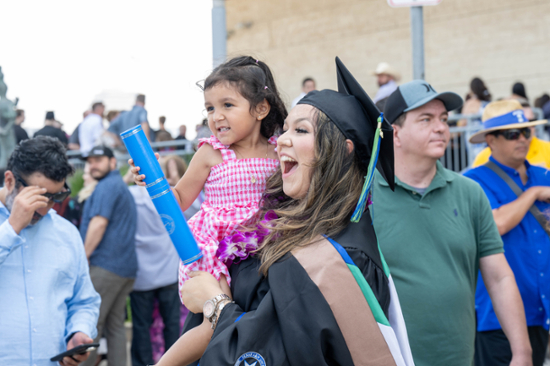Islander Dining Hall Celebrates ‘Ocean Friendly’ Recognition
CORPUS CHRISTI, Texas – Texas A&M University-Corpus Christi’s Islander Dining Hall is celebrating a new wave of sustainability following its newest recognition and title as an Ocean Friendly Restaurant (OFR). As only the second university dining hall in the nation to receive the recognition, the Islander Dining Hall joins more than 400 restaurants across the U.S. working to help lower an estimated 5.25 trillion pieces of plastic currently plaguing the world’s marine ecosystems and wildlife. The Coastal Bend Chapter of the Surfrider Foundation awarded the title to the dining hall on Oct. 30, following valiant efforts by Texas A&M-Corpus Christi’s Islander Green Team and Chartwells, the University’s contracted food service provider, to keep campus dining eco-friendly.
“With the University surrounded by Oso Bay and Corpus Christi Bay, it is important that we take initiative to reduce the amount of plastic and Styrofoam waste that could potentially come from Islander Dining Hall,” said Elizabeth Alford, Marketing Manager for Chartwells and the Islander Dining Hall. “It is imperative that we use our location as an educational tool for our students. This recognition encourages our community to be stewards of the environment.”
According to the Surfrider Foundation, A&M-Corpus Christi sets an example for campuses across the country to work towards reducing single-use waste like straws and plasticware. The University Dining Hall contributes to these efforts by banning the use of Styrofoam, using reusable food-ware for onsite dining, providing paper straws upon request, excluding the use of plastic bags, and following proper recycling practices. The dining hall also only serves sustainable seafood and includes a regular option for vegan and vegetarian students including fresh fruit, vegetables, vegan tortillas, and pancakes to name a few. The dining hall also offers biodegradable coffee cups and to-go plates to mitigate pollution.
“Student involvement is critical because they are paving the way for the future health of the community,” said Christi Irps, Restaurant Coordinator for the Surfrider Foundation-Texas Coastal Bend Chapter. “Our hope is that other university dining halls and school cafeterias will also make commitments to reduce the abundant waste produced by using plastic packaged drinks and meals. These students are an inspiration.”
Over the course of two semesters, students, dining hall staff, and representatives from the Surfrider Foundation worked diligently to check off each requirement on the checklist to become an OFR. The final requirement for the Dining Hall was to accommodate recyclable waste. The Islander Green Team and Chartwells led this final requirement by collecting and measuring food waste and repurposing it through compost and recycling.
“The fact that the dining hall is taking the right steps to reduce the amount of plastic and Styrofoam is a big step in the right direction in preventing pollution from finding its way into our surrounding bays,” said Melissa Zamora, Islander Alumna, Campus Facilities Coordinator and Founder of the Islander Green Team.
The Islander Dining Hall also participates in other sustainability programs such as the Waste Not Program and Project Clean Plate which leads up to International Stop Food Waste Day in April.
“I think most students realize that as the Island University, we’re surrounded by the ocean, and it’s important that we take pride and work to protect it,” said Jessica Palitza, environmental science major “We need to use practices that are going to insure sustainability for the future because we’re all on this same Earth together.”





































